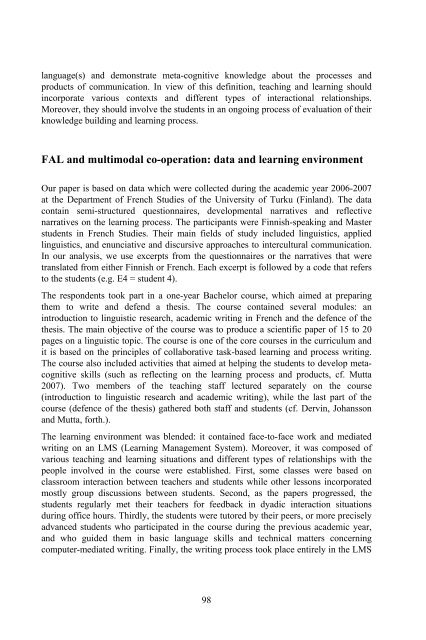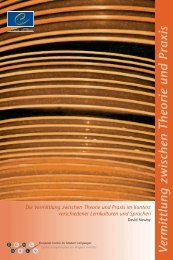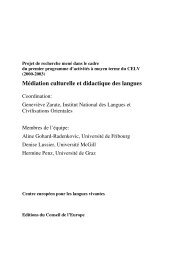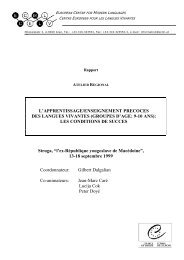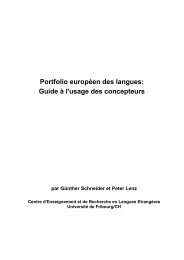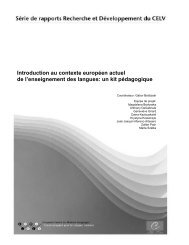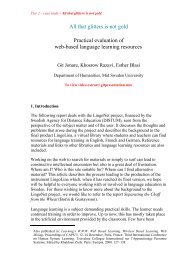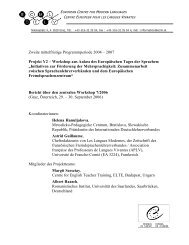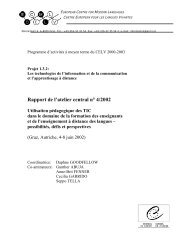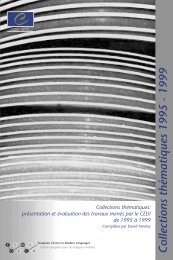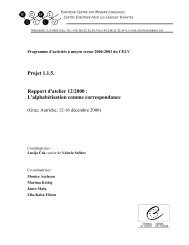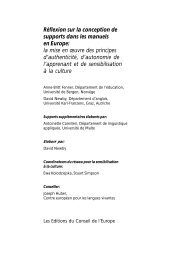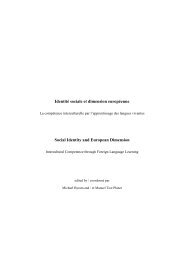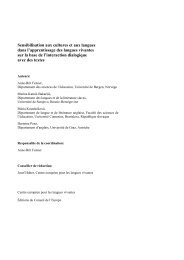cohesion - European Centre for Modern Languages
cohesion - European Centre for Modern Languages
cohesion - European Centre for Modern Languages
Create successful ePaper yourself
Turn your PDF publications into a flip-book with our unique Google optimized e-Paper software.
language(s) and demonstrate meta-cognitive knowledge about the processes and<br />
products of communication. In view of this definition, teaching and learning should<br />
incorporate various contexts and different types of interactional relationships.<br />
Moreover, they should involve the students in an ongoing process of evaluation of their<br />
knowledge building and learning process.<br />
FAL and multimodal co-operation: data and learning environment<br />
Our paper is based on data which were collected during the academic year 2006-2007<br />
at the Department of French Studies of the University of Turku (Finland). The data<br />
contain semi-structured questionnaires, developmental narratives and reflective<br />
narratives on the learning process. The participants were Finnish-speaking and Master<br />
students in French Studies. Their main fields of study included linguistics, applied<br />
linguistics, and enunciative and discursive approaches to intercultural communication.<br />
In our analysis, we use excerpts from the questionnaires or the narratives that were<br />
translated from either Finnish or French. Each excerpt is followed by a code that refers<br />
to the students (e.g. E4 = student 4).<br />
The respondents took part in a one-year Bachelor course, which aimed at preparing<br />
them to write and defend a thesis. The course contained several modules: an<br />
introduction to linguistic research, academic writing in French and the defence of the<br />
thesis. The main objective of the course was to produce a scientific paper of 15 to 20<br />
pages on a linguistic topic. The course is one of the core courses in the curriculum and<br />
it is based on the principles of collaborative task-based learning and process writing.<br />
The course also included activities that aimed at helping the students to develop metacognitive<br />
skills (such as reflecting on the learning process and products, cf. Mutta<br />
2007). Two members of the teaching staff lectured separately on the course<br />
(introduction to linguistic research and academic writing), while the last part of the<br />
course (defence of the thesis) gathered both staff and students (cf. Dervin, Johansson<br />
and Mutta, <strong>for</strong>th.).<br />
The learning environment was blended: it contained face-to-face work and mediated<br />
writing on an LMS (Learning Management System). Moreover, it was composed of<br />
various teaching and learning situations and different types of relationships with the<br />
people involved in the course were established. First, some classes were based on<br />
classroom interaction between teachers and students while other lessons incorporated<br />
mostly group discussions between students. Second, as the papers progressed, the<br />
students regularly met their teachers <strong>for</strong> feedback in dyadic interaction situations<br />
during office hours. Thirdly, the students were tutored by their peers, or more precisely<br />
advanced students who participated in the course during the previous academic year,<br />
and who guided them in basic language skills and technical matters concerning<br />
computer-mediated writing. Finally, the writing process took place entirely in the LMS<br />
98


